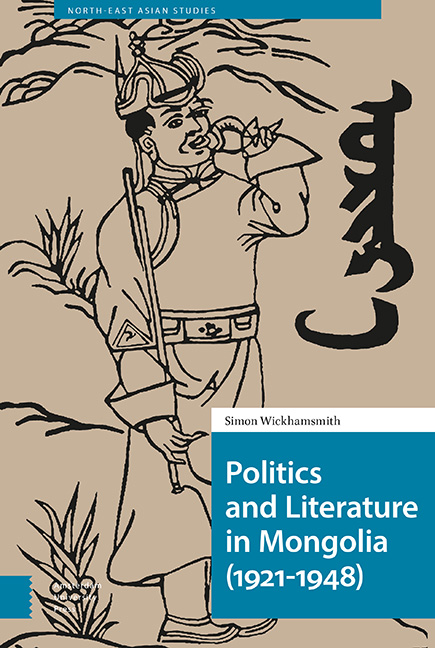Book contents
- Frontmatter
- Dedication
- Contents
- Transliteration and Mongolian Names
- Introduction
- 1 Prefiguring 1921
- 2 Staging a Revolution
- 3 Landscape Re-Envisioned
- 4 Leftward Together
- 5 Society in Flux
- 6 Negotiating Faith
- 7 Life and its Value
- 8 The Great Opportunistic Repression
- 9 A Closer Union
- Appendix: Brief Biographies of Writers
- Index
6 - Negotiating Faith
Published online by Cambridge University Press: 21 November 2020
- Frontmatter
- Dedication
- Contents
- Transliteration and Mongolian Names
- Introduction
- 1 Prefiguring 1921
- 2 Staging a Revolution
- 3 Landscape Re-Envisioned
- 4 Leftward Together
- 5 Society in Flux
- 6 Negotiating Faith
- 7 Life and its Value
- 8 The Great Opportunistic Repression
- 9 A Closer Union
- Appendix: Brief Biographies of Writers
- Index
Summary
Abstract
Mongolia's response to religion – specifically to Buddhism – was quite different to Moscow's hardline push towards atheism and tended to emphasize personal choice of religion while seeking to remove financial and social power from monasteries and senior monks. Much of the literature focuses on the hypocrisy of monks, showing how they used their elevated social position to elicit sexual favors, among other things (as in D. Natsagdorj's ‘The Venerable Monk's Tears’ [Lambuguain nulims]). The anti-government uprising in the center-west of the country in the spring of 1932 and the resulting implementation of the moderate New Turn Policy (Shine ergeltiin bodlodo) became the theme of several short stories, including two (‘Balchinnyam the Urianhai’ [Urianhai Balchinnyam] and ‘A Heroic Struggle’ [Baatarlag Temtsel]) written in 1936 by Sh. Sodnomdorj, who himself had fought in the Red Army against the uprising.
Keywords: Buddhism, atheism, society of the godless, monks and nuns, lamas, traditional faith, religious repression
In an essay published on 13 May 1909, Vladimir Lenin made the following statement about religion in the Russian Bolshevik magazine Proletary, of which he himself was the editor:
Let us recall that in his essay on Ludwig Feuerbach, Engels reproaches Feuerbach for combating religion not in order to destroy it, but in order to renovate it, to invent a new, ‘exalted’ religion, and so forth. Religion is the opium of the people – this dictum by Marx is the cornerstone of the whole Marxist outlook on religion. Marxism has always regarded all modern religions and churches, and each and every religious organisation, as instruments of bourgeois reaction that serve to defend exploitation and to befuddle the working class.
Lenin's appeal to Engels's critique of Feuerbach – whose 1841 critique of Christianity in Das Wesen des Christentums had exercised considerable influence on Marx's thinking on religion – is significant because of its explicit and fundamental rejection of religion. And the closer Lenin – who became increasingly incapacitated – moved towards death, which would finally come in January 1924, the more vigorously the Bolsheviks moved to increase the propaganda offensive against religion, developing an atheistic publishing machine that sought to explain the historical and social justification against religion and for atheism.
- Type
- Chapter
- Information
- Politics and Literature in Mongolia (1921–1948) , pp. 201 - 236Publisher: Amsterdam University PressPrint publication year: 2020



